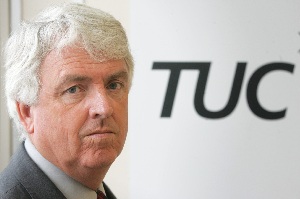|
Long hours working on increase

LONG hours
working is on the increase in the UK, reversing the slow but steady
10-year decline in people working more than 48 hours a week -
according to a new TUC analysis.
More than 1 in 8 of the workforce now work more than 48 hours each
week, with as many as 1 in 6 in London putting in 48 hours plus a
week. In the North West, there are 306,000 people working more
than 48 hours per week.
The law protects people against an average working week of more than
48 hours unless they opt out of working time rules. But the TUC says
that a lack of enforcement means that bad employers know that this
is one employment right that they can breach with little or no risk
of any consequences. Good employers have responded to concerns
about the need for a greater work-life balance. But these figures
show that a hard core of bad employers are taking no notice of
either the law or calls from government, progressive employers and
unions, says the TUC.
The latest Labour Force Survey shows that 93,000 more people now
work more than 48 hours a week, taking the total to 3,242,000. This
is a rise to 13.1% of the workforce (up from 12.8% last year).
The biggest increases in the numbers of people working in excess of
48 hours are in the South East (an increase of 28,000 to 525,000),
and London (an increase of 25,000 to 481,000). These 2 regions have
the highest proportion of the workforce working long hours (16.1% in
London and 14.8% in the South East). The biggest increase in
the share of the workforce putting in more than 48 hours took place
in Wales where it went up 1.3% to 12.2%. Only the South West and the
East Midlands buck the trend with a small fall in long hours
workers.
North West TUC Regional Secretary Alan Manning said:- “These
are very disturbing numbers. They suggest that the slow, but at
least steady, decline in those working more than 48 hours a week has
come to an end. Many employers recognise that overworked staff are
unproductive by introducing more flexibility and better work-life
balance, often under union pressure. But it now looks as if their
efforts are being undone by those who don’t care about long hours.
No-one should forget that 48 hours is 6, 8-hour days – more than
enough for anyone every week.
There is undoubted abuse of the law, but employers know they can get
away with it because it is rarely enforced. Neither the Health and
Safety Executive nor local authorities - who share responsibility
for enforcement - have the resources to implement the law. And the
Government knows that employers can abuse the opt-out as ministers
consulted on ways to close loopholes in 2004, but have yet to bring
forward any concrete proposals for change. The current discussions
on how best to protect vulnerable workers and enforce existing
rights must include working time rights and closing the loopholes
that make a voluntary opt-out a joke.”
The TUC says that these official figures underestimate long hours
working as the sample on which the survey is based is unlikely to
include a proper share of migrant workers and excludes those who
live at their place of work, such as some hotel and care staff who
work long hours. Under Europe’s working time regulations
workers are protected from working more than an average 48-hour
week. But in the UK – unlike other EU countries – all workers can
opt out of this protection. Previous TUC research shows that this is
widely abused – 2/3rds are not asked to opt out before they are
expected to work in excess of 48 hours and a 1/4 of those who signed
were given no real choice about opting out.
|
UK nations and regions |
Working more than 48
hours per week 2007 (thousands) |
Changes since 2006
(thousands) |
|
South East |
525 |
28 |
|
London |
481 |
25 |
|
Eastern |
339 |
18 |
|
Wales |
143 |
17 |
|
Scotland |
258 |
12 |
|
North East |
118 |
0 |
|
North West (inc Merseyside) |
306 |
0 |
|
Yorkshire and Humberside |
242 |
0 |
|
West Midlands |
266 |
0 |
|
Northern Ireland |
61 |
0 |
|
South West |
262 |
-14 |
|
East Midlands |
240 |
-15 |
|
Total |
3,242 |
93 |
|
UK nations and regions |
% of employees working
more than 48 hours per week |
Changes since 2006 (%) |
|
Wales |
12.2 |
1.3 |
|
London |
16.1 |
0.9 |
|
South East |
14.8 |
0.9 |
|
Eastern |
14.6 |
0.7 |
|
Northern Ireland |
9.4 |
0.7 |
|
North East |
11.7 |
0.6 |
|
Scotland |
11.8 |
0.5 |
|
West Midlands |
12.3 |
0.2 |
|
North West (inc Merseyside) |
11.3 |
0 |
|
Yorkshire and Humberside |
11.8 |
-0.1 |
|
East Midlands |
13.3 |
-0.6 |
|
South West |
12.4 |
-0.7 |
|
Total |
13.1 |
0.3 |
 |
Cultural collages launched
ARTWORK
created by local people – and inspired by Adrian Henri and Peter
Blake – is about to go on display at Liverpool Central library.
Liverpool Community College has teamed up with Mersey Care NHS Trust
to encourage people with mental health problems to produce 2
stunning pieces of art celebrating Liverpool's rich history of music
and art as the city approaches its Capital of Culture year.
The pieces also celebrate Liverpool’s twinning with Stavanger, the
Norwegian city designated next year’s non-European Capital of
Culture. And the exhibition will pave the way for a major cultural
exchange between mental health services in both cities.
Liverpool Community College worked with Mersey Care NHS Trust and
Stavanger Mental Health Services on the project. Learners of all
abilities created the pieces during sessions at the college and in
the Occupational Therapy department at the Broadoak Unit, an adult
mental health in-patient unit in Broadgreen, Liverpool.
Their brief was ‘Liverpool, Art and Music’ and the result is two
spectacular collages, entitled ‘You'll Never Walk Alone’ and ‘The
Twinning of Liverpool and Stavanger 08’ inspired by Adrian Henri's
"Entry Of Christ Into Liverpool", and Peter Blake's collage
"Sergeant Peppers Lonely Hearts Club Band."
Liverpool City Council’s executive member for libraries, Councillor
Colin Eldridge, said:- “This is a fantastic project which has
brought together people from different sections of the community and
given them the chance to express what Liverpool’s culture means to
them. We want the people of the city to be at the heart of
Capital of Culture, and these stunning artworks are a great example
of how we can get our communities engaged in the celebrations.”
The colourful mixed media images, produced on canvas in paint and
collage, feature Liverpool icons such as The Beatles, George Melly,
Adrian Henri himself and the statues from Gormley's ‘Another Place’
– all set against the backdrop of Liverpool’s world famous skyline.
They also capture Liverpool diverse cultural heritage and the
massive regeneration going on in the city.
Project co-ordinator at the community college, Judy Mazonowicz,
said:- “All the service users involved on this artwork have
mental health problems and the work they do with us helps raise
their self esteem and breaks down barriers to attending college.”
Head Occupational Therapist at the Broadoak Unit, Ann Gallagher,
said:- “The collage ‘The Twinning of Stavanger and Liverpool
08’ is an example of the brilliant skills of our service users. The
collage also celebrates the excellent work which has developed from
our partnership with the City of Liverpool Community College.”
Mersey Care’s Stavanger project lead Judith Mawer said:- “We
are hoping to engage in a cultural exchange with mental health
service users and workers in Stavanger, Norway, and our occupational
therapists and activity workers have been facilitating a creative
project with this in mind. Choosing to explore art and music
with service users at Broadoak reflects their take on the Liverpool
pop art and music scene. Liverpool’s reputation in this respect is
internationally renowned and I’m sure that the people of Norway will
equally enjoy spotting famous faces who have gained celebrity for
their creative talent.”
Liverpool Culture Company Creative Health and Well Being Manager
Julie Hanna said:- “Individuals who receive services from
Mersey Care NHS Trust are exploring their local culture such as
music, art and food and then finding creative ways to express this
culture and share with people with similar mental health problems in
Stavanger. The Capital of Culture year allows us to see afresh
the place we live, the things we do and the people we do spend time
with. And these are the things that can help us to keep emotionally
healthy. “
The artwork is launched at Liverpool Central Library on Wednesday 28
November, remaining on display until the end of 2007. In the New
Year is will move to community venues and libraries throughout the
city during 2008, starting with Childwall Library and then Spellow
Library, Walton.
Get
a Letter from Santa this Christmas and help vulnerable children

WITH Christmas
less than 30 days away, people from across the region are being
encouraged to get in the festive season this Christmas and support
the NSPCC’s Letter from Santa fundraising campaign – supported by
Hotpoint. Parents, carers, grandparents, aunts and uncles can
support the children’s charity and bring some magical festive cheer
into a child’s life by arranging to have a special letter from Santa
delivered to their door.

Janette Drew, NSPCC community fundraising manager said:-
“Letter from Santa is a brilliant way to add an extra sparkle to a
child’s Christmas. For a minimum donation of just £5, they will
receive a special personalised letter, flown all the way from
Santa’s grotto in Lapland by his trusted reindeer.
But it is important to remember that Christmas is not a time of
celebration for every child. Over the 12 days of festive cheer last
year, ChildLine – a service provided by the NSPCC - counselled 4,756
children who were in danger or distress and had nowhere else to
turn. Parents, grandparents, families and friends who support Letter
from Santa, will help create a safer, happier Christmas for these
children.
To receive a Letter from Santa for a child you know, you can call
0870 325 9012 or order online at
www.nspcc.org.uk/santa by 14 December 2007.”
|

